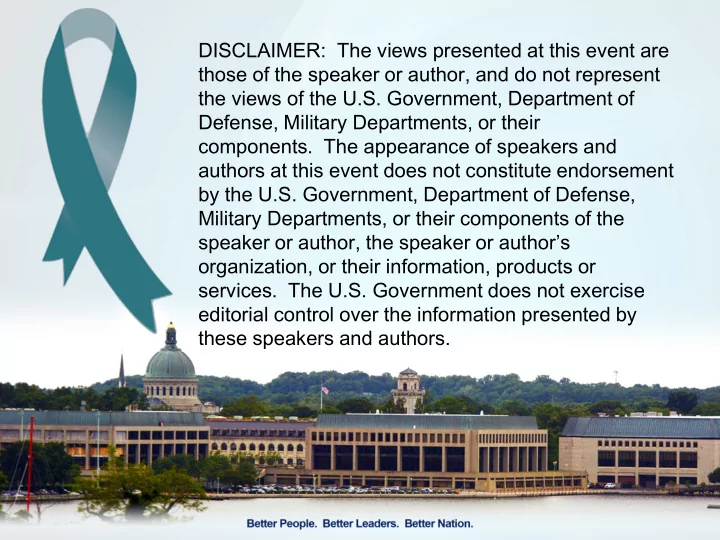

DISCLAIMER: The views presented at this event are those of the speaker or author, and do not represent the views of the U.S. Government, Department of Defense, Military Departments, or their components. The appearance of speakers and authors at this event does not constitute endorsement by the U.S. Government, Department of Defense, Military Departments, or their components of the speaker or author, the speaker or author’s organization, or their information, products or services. The U.S. Government does not exercise editorial control over the information presented by these speakers and authors.
SKILLS FOR HEALTHY RELATIONSHIPS: BUILDING ROMANTIC COMPETENCE IN YOUNG PEOPLE Joanne Davila, PhD Stony Brook University United States Naval Academy Annapolis MD April 4, 2019
The features of a healthy relationship Intimacy • Security • Respect • Good communication • A sense of being valued • The features of an unhealthy one Unresolved conflict • Lack of support • Criticism, contempt, hostility • Aggression and violence •
PROBLEMS IN RELATIONSHIPS CAN LEAD TO… • Relationship distress/low satisfaction • Relationship break-ups/divorce • Poor physical health • Poor mental health, especially depression • Poor work and school performance • Poor outcomes for children
BUT THERE’S A PROBLEM
THE PROBLEM: • People know what a healthy relationship looks like • But most don’t know how to get one • And no one ever teaches them how to do so
WHEN DO WE TYPICALLY TEACH PEOPLE HOW TO HAVE HEALTHY RELATIONSHIPS? • Couple therapy • Pre-marital relationship education Fail to address: Genuinely knowing what you need in a partner and a relationship Selecting the right person Having and using the skills to build a healthy relationship right from the beginning
THE SOLUTION TO THE PROBLEM: We need to identify the skills necessary to create a healthy relationship and reduce the behaviors that lead to unhealthy relationships
ROMANTIC COMPETENCE The capacity for people to function adaptively in their romantic lives • Three skills: • Insight All stages of the relationship process • Mutuality Regardless of relationship status • Emotion regulation Regardless of relationship type
INSIGHT • Awareness, understanding and learning • With insight, you’ll be able to: • Know yourself better – who you are, what you need, why you do the things you do… • Know the same things about your partner (or potential partner) • Anticipate what the positive and negative consequences of your actions will be • Learn from your mistakes in ways that allow you to make better choices in the future • Have a greater understanding about what kind of person and relationship is right for you
MUTUALITY • Both people have needs and both are important • With mutuality, you’ll be able to: • Communicate your needs in a clear, direct way that optimizes your chances of getting them met • Be willing and able to meet your partner’s needs • Factor both sets of needs into decisions that you make about your relationship
EMOTION REGULATION • Regulate your feelings in response to things that happen in your relationship life • If you’re practicing emotion regulation you’ll be able to: • Keep your emotions calm when you’re upset about things and keep things that happen in your relationship in perspective • Tolerate uncomfortable feelings rather than acting impulsively on them and think more clearly about your decisions and actions • Maintain self-respect and commitment to your needs even when difficult things happen in your relationship
RESULTS Greater romantic competence was associated with better relational functioning and greater individual well-being Romantic attachment security Relationship decision making Relationship satisfaction Fewer symptoms of depression and anxiety Largely true for both women and men Supports the model of romantic competence
RESULTS Greater romantic competence was associated with more adaptive couple behavior Adaptive social support behavior Positive emotional expression Adaptive problem solving behavior Then predicts satisfaction and break-up status Supports the model of romantic competence
RE WORKSHOP Four key issues: • Figure out whether a relationship is right for you. • Understand what makes a relationship work. • Know when to stay in a relationship and when to go. • Deal with a break-up effectively and in a way that lets you move forward.
PROMOTION OF THE SKILLS • Insight • Awareness of traits, thoughts/feelings/behaviors, needs • Consequential thinking • Mutuality • Perspective-taking, understanding, empathy • Communication and problem solving skills • Emotion Regulation • Emotional awareness and identification of emotions • Distress tolerance, tolerance of uncertainty, and reduction of impulsive behavior • Appropriate emotional expression • Mindfulness skills • Creation of realistic, healthy self-talk
KEY THEMES Both people in a relationship have needs that deserve to get met Approach relationships from a place of personal strength – where you feel worthy and deserving Know what you want and what your limits are Be with someone who wants what you have to offer – don’t try to make yourself into what you think that person wants For a healthy relationship, love is necessary but not sufficient A breakup isn’t the end of the world, it’s a sign that the relationship wasn’t right for you
RELATIONSHIP EDUCATION RE compared to WL Within RE group At post-test, 91% said they would do At post-test and FU, RE reported: something different Greater confidence about using the skills Greater ability to cope with RR problems At FU, 67% said they did do something More adaptive relationship decision making different Communicate better In one sample: Lower endorsement of dysfunctional Listened more beliefs about aggression Paid attention to my needs Understand my feelings better More realistic
THANK YOU! Thanks to : • Stony Brook University • The RDC Lab (past and present) • Vickie Bhatia, Jess Latack, Brian Feinstein, Jiaqi Zhou, Lauren Mize • Nicole Barle, Leanne Zinn, Korey Abbriano • Alexandra Byrne, Haley Wodarczyk, Katie Chan, Jeremy Jabbour, Ruth Hernandez Montiel, • Jonathan Mattanah, PhD at Towson U. • Kaycee Lashman, book co-author QUESTIONS? Contact me: joanne.davila@stonybrook.edu
Recommend
More recommend